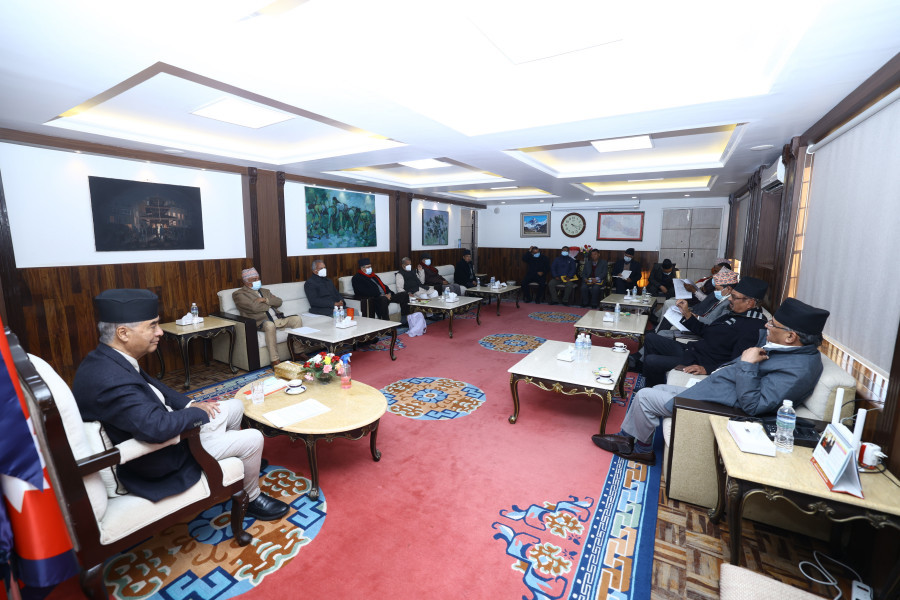
The Millennium Challenge Corporation Nepal Compact, an American grant worth $500 million, has reached a tricky stage, with the ruling coalition sharply divided over its parliamentary ratification.
While Prime Minister Sher Bahadur Deuba and his Nepali Congress are for pushing the Millennium Challenge Corporation (MCC) Nepal Compact through the House, his coalition partners—Communist Party of Nepal (Maoist Centre), CPN (Unified Socialist), Janata Samajbadi Party and Rastriya Janamorcha—are dead against it, saying some clauses must be amended before the compact’s ratification.
When the winter session of the House was called starting December 14, there were talks that the government would table the compact for its ratification. But after a meeting of the coalition followed by an all-party meeting on Sunday, it is highly unlikely the government would make a move. The CPN-UML, the main opposition, boycotted the all-party meeting called by Prime Minister Deuba.
“We are in a tricky situation,” said Gagan Thapa, a Nepali Congress lawmaker who recently won the party general secretary post. “We also need to know what the UML is up to. On the one hand, it is obstructing the House, and on the other, it has not made its position clear on the MCC.”
The UML was supportive of MCC’s ratification until its chair KP Sharma Oli was in power until July 12 this year—after all, his finance minister Yubaraj Khatiwada had registered the pact in Parliament on July 15, 2019. But since Oli was ousted, the UML has changed its tone.
Many say now Oli is trying to fish in troubled waters, as he sees a chance of the coalition breaking apart over the US grant, which has become a highly divisive issue in Nepal, not only at the political level but also at the community level.
Within the UML also there are some strong voices against the MCC.
“We are not in a position to extend our support for MCC ratification in the present condition,” said Bishal Bhattarai, chief whip of the UML. “But allegations that we are trying to take advantage of the situation are wrong. It’s up to the ruling coalition how it takes the pace forward. We will see when the government tables the pact in the House for ratification. Whether the coalition breaks or remains intact is their business, not ours.”
As of now, the UML’s sole agenda is House obstruction. On Tuesday also, the party obstructed the House proceedings. It has been protesting against Speaker Agni Sapkota’s non-action on its decision to expel 14 of its lawmakers, including Madhav Nepal. After Sapkota failed to take action, Nepal on August 25 registered a new party—CPN (Unified Socialist). The UML says it does not recognise the party. It has also filed petitions against the Speaker and the Election Commission at the Supreme Court.
Sunday’s meeting of the ruling coalition has formed a team led by Jhala Nath Khanal of the CPN (Unified Socialist) to “study” the MCC and report back.
Congress leader Gyanendra Bahadur Karki, also the minister for communication and information technology, and Narayan Kaji Shrestha of the Maoist Centre are members.
Khanal is a staunch opponent of the MCC and he had led a task force formed by the Nepal Communist Party (NCP) to “study” the US agreement. His task force had presented a report saying some clauses of the MCC undermined Nepal’s sovereignty and that they needed amendment. The NCP was invalidated by the Supreme Court on March 7 this year. Khanal now is a leader of the CPN (Unified Socialist).
No timeline has been set for the Khanal team to present its report.
Insiders in the ruling coalition, however, say the MCC will remain as it is for now, until the Maoist Centre’s national conference which is set to start from Sunday in Kathmandu.
There are also talks about deferring the House meeting until the Maoist conference is over.
The Khanal-led team, however, has not held a single meeting since it was formed on Sunday.
A Congress leader close to Deuba said that the prime minister is confident that the MCC would be ratified by Parliament very soon.
“The deadlock over the MCC will be over soon,” said the leader. “If the coalition partners continue to take a firm position against the MCC, the prime minister will take a decision.”
The leader did not elaborate, but speculations are rife that the Nepali Congress could forge a deal with the UML for passing the MCC. But that will run the risk of the coalition breaking apart.
Deuba over the past few months since he was appointed prime minister has given word to some top US officials that he is for ratifying the MCC.
From MCC Vice President Fatema Sumar to US Assistant Secretary of State for the Bureau of South and Central Asian Affairs Donald Lu to MCC Deputy Chief Executive Officer Alexia Latortue, Deuba has assured all of them that his government is committed to ratifying the MCC from the House.
Leaders from Deuba’s orbit have told over the past months that failure to move the MCC ahead would send across a negative message about Nepal.
At least two Congress leaders said that Deuba is under huge pressure to make a ‘bold decision’ on the MCC—even if it comes with the support from the UML and at the expense of breaking the alliance.
After Deuba started mounting pressure on the ruling alliance, especially the Maoist Centre and the CPN (Unified Socialist), to take an early decision on the MCC by the end of this week, both parties are under pressure.
The two parties are not in a position to support the US grant. If they don’t, the coalition could fall apart, insiders say.
Confusion hence persists as to how the American grant would move forward.
“We have asked Minister Karki to collect all the documents related to the MCC,” said Shrestha, the Maoist leader who is a member of the Khanal-led team formed to study the grant.
A senior Congress leader said the Khanal-led team is unlikely to present a common position at least until the Maoist conference.
Karki, the minister for communication and information technology, said there soon will be a way out as discussions “are being held among stakeholders.”
“Our best efforts would be to find a common ground as soon as possible,” said Karki. “After consultations with all relevant stakeholders, we will provide our suggestions to the alliance partners.”













